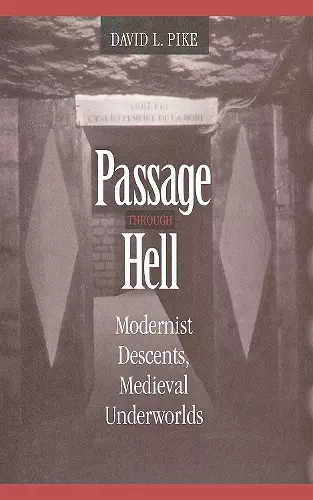Passage through Hell
Modernist Descents, Medieval Underworlds
Format:Hardback
Publisher:Cornell University Press
Published:16th Jan '97
Currently unavailable, and unfortunately no date known when it will be back

Taking the culturally resonant motif of the descent to the underworld as his guiding thread, David L. Pike traces the interplay between myth and history in medieval and modernist literature. Passage through Hell suggests new approaches to the practice of comparative literature, and a possible escape from the current morass of competing critical schools and ideologies.
Pike's readings of Louis Ferdinand Céline and Walter Benjamin reveal the tensions at work in the modern appropriation of structures derived from ancient and medieval descents. His book shows how these structures were redefined in modernism and persist in contemporary critical practice. In order to recover the historical corpus of modernism, he asserts, it is necessary to acknowledge the attraction that medieval forms and motifs held for modernist literature and theory. By pairing the writings of the postwar German dramatist and novelist Peter Weiss with Dante's Commedia, and Christine de Pizan with Virginia Woolf, Pike argues for a new level of complexity in the relation between medieval and modern poetics.
Pike's supple and persuasive reading of the Commedia resituates that text within the contradictions of medieval tradition. He contends that the Dantean allegory of conversion, altered to suit the exigencies of modernism, maintains its hold over current literature and theory. The postwar writers Pike treats—Weiss, Seamus Heaney, and Derek Walcott—exemplify alternate strategies for negotiating the legacy of modernism. The passage through hell emerges as a way of disentangling images of the past from their interpretation in the present.
This book constitutes a major achievement and veritable comparative tour de force; it will provide much methodological stimulation, and it offers many a new insight into the authors and texts selected for scrutiny.
* German Quarterly *This dense, extensively researched, and intellectually challenging project will hold very different sorts of appeal for different kinds of readers. To my mind, the book's great strength lies in the rich tapestries of literary history it weaves together in telling detail about each author treated, revealing aspects of the myth of the descensus ad inferos that have been decisive for modern as well as for medieval versions of the myth. Pike's configurations of authors in strategic relations to one another are fascinating and give very new and provocative insights into key modernist writers and their relations to the medieval past that they construct.
* Specul- Winner of Winner of the 1997 Gustave O. Arlt Award in the Hu.
ISBN: 9780801431630
Dimensions: 229mm x 152mm x 27mm
Weight: 907g
320 pages